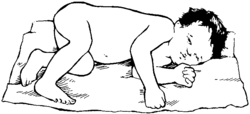Hesperian Health Guides
Special situations
Contents
Babies with extra needs can breastfeed
Small or weak baby.
If a small or weak baby cannot suckle strongly enough to feed itself, you will need to remove your milk by hand and feed the baby with a cup. Begin right after birth, and continue even when the baby can suckle some by itself. This will help your breasts make more milk. If your baby weighs less than 1½ kg or 3½ pounds, it may need specific medical care, including a tube that goes through the nose and down to the stomach. Your milk can be given through that tube. Talk with a health worker about this
Baby born too early.
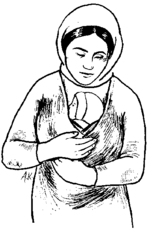
Babies born too early need extra care to stay warm. Place the baby naked, wearing a hat and a diaper, upright inside your clothing, against your skin and between your breasts. (It helps to wear a loose blouse, sweater, or wrap tied at the waist.) In some places this is called “kangaroo care.” Keep skin-to-skin contact inside your clothing day and night, and breastfeed often. If the baby suckles weakly, also give milk you have removed by hand.
Cleft lip or cleft palate.
These babies may need more help to learn how to suckle. If the baby has only a cleft lip, it can still suckle well. (To help make a seal, use your finger to cover the cleft.) If the roof of the mouth is also open (cleft palate), try holding the baby more upright and pushing the nipple to the part of the mouth away from the cleft. You may need to get help from someone with experience feeding a baby with cleft palate. Remove your milk by hand to keep up a good supply while the baby is learning to suckle.
Yellow baby (jaundice).
A baby with yellow skin needs plenty of sunlight and breast milk to lose the yellow color. Babies with jaundice may be very sleepy. If a baby is too sleepy to take the breast, remove milk by hand and give it with a cup and spoon, at least 10 times in 24 hours. Put the baby in the sun in the early morning and late afternoon. Or keep the baby in a bright room.
Most jaundice does not start until 3 or more days after birth and clears up by the 10th day. If the baby has jaundice or very yellow eyes at any other time, or if a jaundiced baby was also born very early, or if the yellowness or sleepiness gets worse, the baby could have a serious illness. If possible, take the baby to a health center or hospital.
| Twins. Sometimes one twin is smaller or weaker. Be sure that each baby gets plenty of your milk. You have enough milk for both babies. Be sure you are getting enough to eat too. | 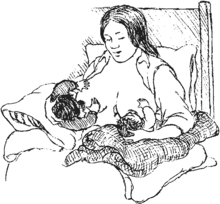 |
How to feed a baby with a cup
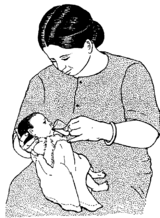
- Use a small, very clean cup. If boiling it is not possible, wash it with soap and clean water.
- Hold the baby upright or almost upright on your lap.
- Hold the cup of milk to the baby’s mouth. Tip the cup so the milk just reaches the baby’s lips. Rest the cup lightly on the baby’s lower lip and let the edges touch the baby’s upper lip.
- Do not pour the milk into the baby’s mouth. Let the baby take the milk into its mouth from the cup.
Breastfeeding when you are sick
More Information
breastfeeding and HIV.If possible, it is almost always better to breastfeed your baby when you are sick, than to feed a baby other foods too soon.
If you have a high fever and sweat a lot, drink plenty of liquid. Breastfeed often to keep producing enough milk. If it is more comfortable for you, breastfeed in the lying-down position. If you need to stop breastfeeding for a few days, remove the milk by hand. Have someone help you if necessary.
Get treatment right away for any serious disease caused by infection, like TB, typhoid, or cholera. It is safe to continue breastfeeding your baby as long as you are being treated
To prevent passing any infection to the baby, wash your hands well with soap and water before touching your baby or breasts, and wear a mask if you have a cough or think you could pass your illness.
When you need medicine
Most medicines pass into breast milk in very small and weak amounts, so they do not harm the baby. It is usually more harmful to the baby to stop breastfeeding.
There are a few drugs that do pass to the baby through breast milk and can cause harm. In this book we have marked these medicines with a warning and suggest other medicines that are safer (see the “Medicines Pages”).
If a health worker tells you to take a medicine, say you are breastfeeding.
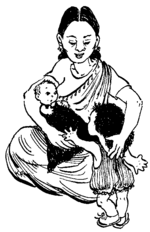
|
| Someone with a new baby and an older baby can safely breastfeed both of them. |
Becoming pregnant or having another child while breastfeeding
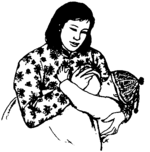
|
| It is safe to breastfeed when you are pregnant. |
If you are nursing and become pregnant, you can continue to breastfeed. Since breastfeeding and pregnancy both make your body work harder, eating plenty of healthy foods is important.
It is also safe to continue breastfeeding an older child if you have a new baby. Feed the younger baby before the older child.



